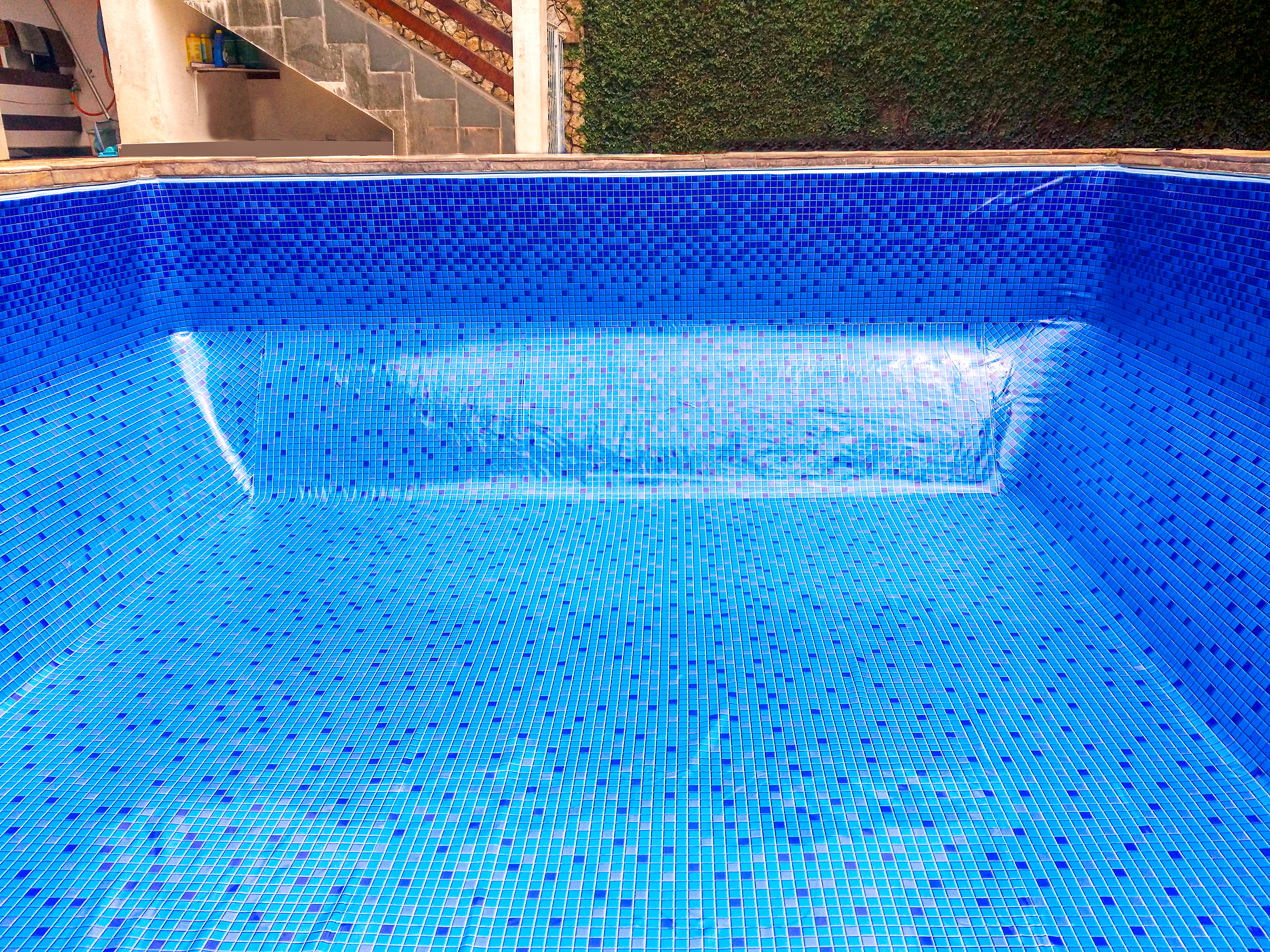
If you’ve been considering installing a new pool in the Buckeye State, this guide will help you understand inground pool costs in Columbus.
Cool pools aren’t all that cool


Pool heaters vary in size depending on how big your pool is and what temperature you want it at.
Calculating your pool’s volume will help determine what size pool heater you need.
Pool heaters can be gas, electric, or solar-powered, and each has its own pros and cons.
There’s nothing like a refreshing dip into your pool, but diving into a cold pool can be an unwelcome shock. A pool heater lets you comfortably use your pool even in chilly weather, as long as it’s the right size. We’ll walk you through how to determine what size pool heater you need to keep your pool at the right temperature every time you jump in.
Pool heaters come in a wide range of sizes, from 30,000 BTUs all the way up to 400,000 BTUs. The size heater you’ll need depends on many factors, from the size of your pool to your ideal temperature. Different types of pool heaters will come in different sizes, and gas heaters will have different recommended BTUs than electric heaters, so you may want to consult with a local pool heater installer to find the right option for your pool.
| Pool Volume (Gallons) | Average BTU Range Needed (Gas Heater) |
|---|---|
| 10,000 | 40,000–60,000 |
| 15,000 | 60,000–90,000 |
| 20,000 | 80,000–120,000 |
| 25,000 | 100,000–150,000 |
| 30,000 | 120,000–180,000 |
When figuring out what size pool heater you need, it helps to understand how pool heaters are measured. All pool heaters are measured using British Thermal Units (BTUs), a unit that measures energy. One BTU represents the amount of energy needed to increase the temperature of 1 pound of water by 1 degree Fahrenheit.
If a pool heater has a high number of BTUs, it can heat a larger pool than a heater with a lower number of BTUs.
Your first step in figuring out the right heater for your pool is to calculate your pool's surface area. The larger your pool's surface area, the easier it is for heat to escape, which means a large pool requires a large heater.
All you need to do to calculate the surface area is multiply the length of the pool by the width. So, if you have a pool that's 15 feet wide and 20 feet long, then your pool's surface area is 300 square feet.
Once you calculate your pool's surface area, you need to calculate its average depth. To find your pool's average depth, all you need to do is determine the depth of the shallowest part and the deepest part, then add those two numbers together and divide them by two.
For example, if your pool is 3 feet deep at its shallowest and 12 feet deep at its deepest, then your pool's average volume is 7.5 cubic feet, since 3 + 12 = 15 and 15/2 = 7.5.
To find the number of BTUs you need in a pool heater, you then need to calculate your pool's volume in gallons. You can find this number by first multiplying your pool's surface area by its average depth. This number will result in your pool's average cubic feet. In order to convert cubic feet to gallons, you then need to multiply the number of cubic feet by 7.48.
For example, if your pool's surface area is 300 and its average depth is 7.5, then its volume in cubic feet is 2,250 because 300 x 7.5 = 2,250. To convert this number to gallons, simply multiply it by 7.48. In this case, 7.48 x 2,250 = 16,830, so the pool holds approximately 16,830 gallons.
You can use a specific formula based on the shape of your pool:
| Pool Shape | Formula for Pool Water Volume (Gallons) |
|---|---|
| Rectangular | Length x Width x Depth x 7.5 |
| Round or circular | Diameter x Diameter x Depth x 5.9 |
| Oval | Length x Width x Depth x 5.9 |
Now that you know your pool's approximate volume in gallons, you can figure out how many BTUs you'll need in a pool heater. But first, you should consider your location's average temperature during a given season.
As you might imagine, your pool heater will need to work harder (i.e. need more BTUs) to heat your pool during cooler weather than warmer weather, so always purchase a heater for the coldest months you'll be using the pool.
The following calculations are based on approximately how many BTUs you'd need to heat your pool to 80 degrees Fahrenheit in 24 hours during different outdoor temperatures.
To find the number of BTUs needed to heat a pool to 80 degrees Fahrenheit on a typical 70-degree day, you should multiply your pool's number of gallons by four.
So, a 15,000-gallon pool will need a pool heater size that can accommodate at least 60,000 BTUs to heat it during a 70-degree day because 15,000 x 4 = 60,000.
You can find the BTUs needed to heat your pool on a 60-degree day by multiplying your pool's gallons by five.
For example, a 15,000-gallon pool will need a pool heater with at least 75,000 BTUs.
If you want to keep your pool warm during a 50-degree day, then you should multiply its gallons by six to find the minimum BTUs you'll need in a pool heater.
For instance, a 15,000-gallon pool will need a heater with 90,000 BTUs.

The calculations above are a great start, but there are several additional factors you'll want to consider in order to find the perfect size heater for your needs. You can also talk to a local pool heater repair professional or pool electrician for more help deciding on the right heater for you.
If you live somewhere that's particularly cold or windy, your pool heater will have to work harder to heat your pool than it would in more temperate climates. In this case, you'll want to get a heater with more than the minimum number of recommended BTUs.
So, if you live in a very windy area and the minimum recommended BTUs for your pool's size during an average 70-degree day is 60,000, then you probably want a heater with at least 75,000 BTUs to account for the extra wind.
Some people like their pool to feel like bathwater, while others prefer it to be much colder. Knowing how warm you want your pool to be during different seasons will help you determine just how much power you need in a heater.
If you love that bathwater feeling, opt for a heater with a high number of BTUs, which will heat your pool to your desired temperature faster than one with lower BTUs.
For most people, a comfortable swimming temperature ranges between 78 to 82 degrees Fahrenheit. If installing a heater, talk to your electrician or pool contractor about how this may impact your electrical bill.
There are several kinds of heaters to choose from, including gas, electric, and solar heaters, and how each pool heater works can vary. Most gas heaters can heat pools faster than electric and solar heaters, but each type has its pros and cons, so you should consider factors like your budget, lifestyle, and personal preferences before committing to a heater.
Pool heaters with a high number of BTUs can heat your pool faster than heaters with lower BTUs. If you only use your pool occasionally, then a heater with lower BTUs that you can turn on a couple of days before you plan to use it is probably fine.
However, if you frequently use your pool, particularly during cooler seasons like spring and fall, then you might want a heater that can work a little faster, in which case you should lean toward the higher BTUs recommended for your pool's size and locale.
Depending on the type of pool you have, you may need to adjust the size of your pool heater. Aboveground pools lose heat faster than in-ground pools, so you'll want to lean toward the higher end of the recommended BTU spectrum if you have an aboveground pool.
The wrong size pool heater can make a big difference in efficiency. An oversized pool heater is less of a worry than one that isn’t big enough, but it’s best to consult with a professional to find out if you should switch yours out for a different size. A heater that’s too small will need to run more often and will be less efficient than one that’s the right size, putting extra wear on the equipment, leading you to have to call someone to repair your pool heater, so it’s probably a good idea to make sure your heater is the right size.
From average costs to expert advice, get all the answers you need to get your job done.

If you’ve been considering installing a new pool in the Buckeye State, this guide will help you understand inground pool costs in Columbus.

The cost of pool liner replacement in Columbus depends on the size and shape of your pool, as well as the liner material and type. Here’s how the costs break down.

Discover how much pool maintenance costs, including average prices, cost factors, and expert tips to help you budget and keep your pool sparkling all season.

If you own a pool, you may wonder: how many gallons in my pool? Read on for our pool volume calculator to learn how much water is in your swimming pool.

Learning how to drain a pool is just as important as all the other upkeep tips you've gathered along the way. Here's a step-by-step DIY guide.

Dreaming of getting in those daily laps without tearing up your backyard? Here’s what to know about endless pool costs so you can plan your project.